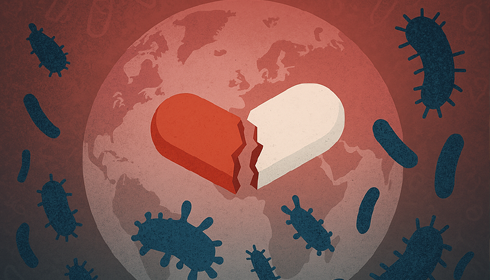
AI Offers a New Weapon in the War Against Drug-Resistant Infections
In a significant step forward for public health, researchers from France and India have developed an artificial intelligence (AI) tool that can assist clinicians in fighting drug-resistant illnesses by offering viable alternative antibiotics—without the need to develop new treatments.
This breakthrough addresses a significant threat: antibiotic resistance. Antibiotic resistance (AMR) occurs when bacteria adapt and stop responding to the antibiotics used to destroy them. This discovery implies that common diseases, such as urinary tract infections or lung infections, might be fatal. The World Health Organisation (WHO) reports that AMR directly kills approximately 1.3 million people annually, primarily in poorer countries, such as India.
Many hospitals, particularly in low- and middle-income countries, currently indicate that 70% of infections acquired within hospitals do not respond to at least one regularly used antibiotic. The pipeline for developing new antibiotics is long and expensive—it can take 10-15 years and more than $1 billion to get a single medicine to market.
As a more immediate answer, scientists and doctors are turning to drug repositioning. This entails adapting existing medications for new applications. However, selecting the appropriate medicine is difficult, especially since microorganisms are constantly changing. This is where the new AI tool comes in.
A collaborative team led by Dr Emilie Chouzenoux of Inria Saclay, France, and Dr Angshul Majumdar of IIIT-Delhi has developed a strong machine learning method to assist clinicians in identifying beneficial antibiotics, even when conventional therapies fail. Unlike typical rule-based systems, our AI learns from two essential data streams: real-world hospital treatment records from top Indian medical centres and molecular-level information, such as bacterial DNA and medication structures. By combining clinical and biological insights, the system identifies previously ignored or underutilised antibiotic choices, providing a more data-driven strategy to combat antibiotic-resistant diseases.
The team tested their system against three of the most dangerous drug-resistant bacteria: Klebsiella pneumoniae, a common ICU threat that causes lung and bloodstream infections; Neisseria gonorrhoeae, the rapidly mutating cause of gonorrhoea; and Mycobacterium tuberculosis, the TB-causing bacteria that continue to kill people in India. Surprisingly, the technology accurately identified medications that were either already effective or had high potential against certain diseases. Its predictions corresponded with current resistance data and were further evaluated by medical specialists, emphasising the tool's potential to combat antibiotic resistance.
This artificial intelligence technology has the potential to revolutionise medicine by closing critical gaps in timely diagnosis and treatment. Rapid analysis of patient data can accelerate the time to successful therapy, potentially reducing deaths and complications. Furthermore, it helps to reduce antibiotic misuse—a significant cause of medication resistance—by providing more accurate, data-driven recommendations. Most critically, the system aims to adapt even in low-resource environments where expensive lab tests are unavailable. Dr Majumdar stated, "Our method enables the effective use of existing knowledge and facilitates the development of smarter, faster responses to AMR, thereby generating new opportunities for equitable and efficient healthcare delivery."
The technique also demonstrates the effectiveness of merging international expertise with local data to solve important challenges. With the right backing, this technology might become part of regular infection control methods in clinics and hospitals.